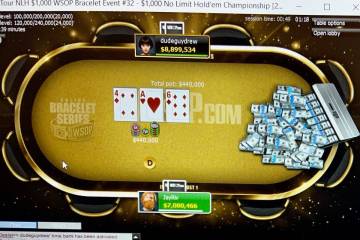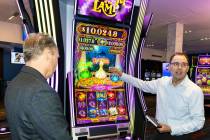Slot machine industry changes concerned investors
We're not a full year into the slot machine industry's brave new world, and some members of the investment community have doubts about the future.
After $16.8 billion was spent on mergers and acquisitions over an 18-month period, consolidation in the gaming equipment manufacturing has subsided.
The buyouts created two slot machine monoliths — Scientific Games Corp. and International Game Technology.
But they won't control the market.
Smaller companies increased their research and development capabilities, and the competition has impressed casino decision-makers.
"Our contacts believe Scientific Games is eventually set to be a 25 percent share of the replacement market going forward in North America," said Janney Montgomery Scott gaming analyst Brian McGill. "This is a considerable drop from the potential 40 percent chatter about a year ago."
Scientific Games and IGT (formerly known as GTECH Holdings) control a large piece of the worldwide lottery market, which gives the companies financial comfort as they navigate a challenged slot machine business. Casino operators are slow to replace older games, and there are few new casinos opening in North America in the coming 12 months.
Union Gaming Group analyst Christopher Jones said the lottery market is "traditionally stable" and provides a steady revenue stream while Scientific Games and IGT work through integration processes.
"Overall the lottery business represents the primary cornerstone of the gaming technology segment," Jones said.
Overhanging the investment community uncertainty is the casino industry's move toward skill-based slot machines, which incorporate video and arcade-style elements. The Association of Gaming Equipment Manufacturers, the trade organization that sponsored the legislation for skill-based gaming, believes new slot machines concepts will be the most important technological change to casino floors in more than a decade.
Manufacturers view skill-based slots as a way to boost the amount of money gamblers wager on slot machines, which has declined more than 23 percent in Nevada since 2008.
State gaming regulators are writing the regulations covering skill-based slots, which is creating more competition. Technology businesses and other nontraditional gaming manufacturers are seeking to become content providers for skill-based games.
This month's Global Gaming Expo in Las Vegas is touted as the industry's showcase to unveil many of these changes.
But there are hints of doubt.
Goldman Sachs & Co. gaming analyst Steven Kent said the slot machine industry transition will take time to reach casino floors.
"We do not expect to see any major game-changing innovation (at G2E), and we also believe casinos are unlikely to make major changes to budgets in the fall," Kent said. "Skill-based gaming could also be a potential catalyst, but likely not for another few years."
Scientific Games and IGT are at the top of the food chain.
After buying slot machine manufacturers WMS Industries for $1.5 billion and Bally Technologies for $5.1 billion within 13 months, Scientific Games is considered the gaming industry's largest manufacturer. Through the Bally deal, the company picked up table game and casino management equipment provider SHFL entertainment, which Bally bought in 2013 for $1.3 billion.
The company's corporate headquarters moved to Las Vegas this year.
Meanwhile, Rome-based GTECH acquired Nevada-based IGT for $6.4 billion. The company took on the name IGT and moved the corporate headquarters to London. IGT located its centralized North American gaming equipment manufacturing center in Reno, but is downsizing its Las Vegas presence.
Other buyouts were of a comparatively smaller scale. Aristocrat Technologies spent $1.3 billion to acquire Video Gaming Technologies, a slot machine provider to the American Indian casino market. Payment processing equipment manufacturer Global Cash Access spent $1.2 billion on slot machine maker Multimedia Games. Global Cash has since been renamed Everi Holdings.
Along with Konami Gaming and Ainsworth Game Technology, the smaller manufacturers are grabbing business.
"We believe competition has not eased," Kent said.
Analysts worry about two aspects of the Scientific Games and IGT mergers: the time spent on cost-cutting synergies and the debt load the two equipment giants need to service.
IGT said it will cut $240 million in costs by 2016. Scientific Games expects to slice $235 million since the Bally deal.
Jones said cost synergy projections are easier to achieve than deleveraging efforts.
The long-term debt numbers are similar. IGT has $8.7 billion of debt while Scientific Games tops out at $8.5 billion.
"Investors shared our concern that the financial leverage level for Scientific Games and IGT was high," Kent said.
Howard Stutz's Inside Gaming column appears Wednesdays and Sundays. He can be reached at hstutz@reviewjournal.com or 702-477-3871. Find on Twitter: @howardstutz




























